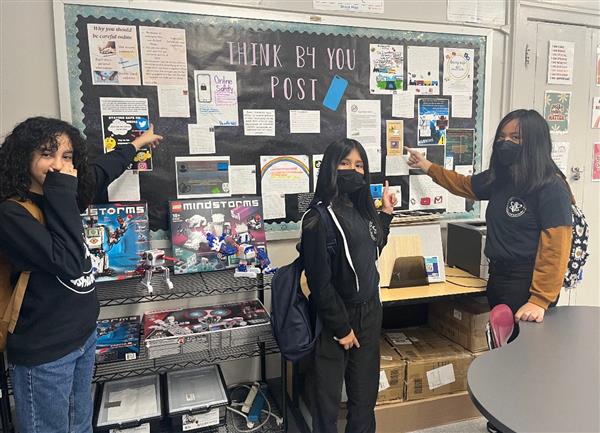
-
SOCIAL MEDIA Guidelines NYC
Definition of Social Media -
Social media is any form of online publication or presence that allows interactive communication, including social networks, blogs, photo sharing platforms, Internet websites, Internet forums, and wikis.
Examples of social media include, but are not limited to, Facebook, Twitter, Edmodo, Schoology, Instagram, YouTube, Google+, and Flickr.Some examples of social media uses include:
Blogging about movies, sports, or news events;
Posting updates or activities on your Facebook page;
Participating in a teacher-established Edmodo group; or
Using a Google Hangout to work on a class project.
Post Responsibly
Be Mindful of Your AudienceUsing social media academically is an extension of
your classroom environment. When you use social media for academic purposes, such as for a school assignment, treat the platform as a digital extension of your classroom – the same rules apply online as-they do at school. For example, if you would not make fun of a classmate in English class, do not do it online either. For school-related social media, do not tag student posts, photos, or videos unless your teacher gives you permission, as this may expose the content to audiences for whom it was not intended.Put your best foot forward.
People of all ages sometimes act differently on social media than they would “face-to-face,” assuming that, because they are not communicating in person, they are not accountable for their actions. In fact, because of the nature of the digital world, you should be as responsible, if not more, when acting online. Since you never know who will ultimately be reading content online, always assume that anyone might have access. If you do not know who will be reading it, ask yourself if you would be okay with a parent or relative reviewing your content. If not, there might be a better way to get your point across.Pause before you post.
Once a comment is posted online, you cannot later say, “never mind.” It may seem funny or harmless when you post it, but it could hurt or offend someone. As guidance, take a few extra minutes to think about whether a post will be hurtful or embarrassing or whether it could negatively affecta future opportunity. For example, if you post an aggressive or inflammatory comment online because you felt heated in the moment, this may end up making you a less attractive candidate in some employers’ minds. Because online posts can never be completely deleted, it is important to make sure that each post is something you want to live with.
Understand the Fine Print
and Other RulesThere is no right to privacy when using school-related social media.
If you are using the school’s device or network, the school may review what you post. The (IAUSP) < http://tinyurl.com/IAUSP > sets forth the “Internet-Don’t List” related to online communication that includes the following:Causing harm to others or damaging technology-related property;
Gaining or attempting to gain unauthorized access to school systems;
Using school technology and/or systems for financial gain or business activities; or
Engaging in criminal or unlawful activities online.
Take Threats of
Cyberbullying SeriouslyCyberbullying takes many forms.
Cyberbullying is the use of electronic technologies to hurt or harm other people. Examples include:Sending offensive text messages or emails;
Posting statements that are not true and create rumors; or
Circulating embarrassing photos of a classmate online.Sometimes, it may be difficult to draw the line between a harmless joke and one which goes to far and becomes hurtful. Chancellor’s Regulation A-832 has a comprehensive definition of the behavior that constitutes cyberbullying.
Report the behavior and get help.
If you are being cyberbullied or hear about/observe someone else being cyberbullied, report the behavior and get help. You can tell a parent, school staff, another adult family member, or a trusted adult. If no adult is available and you or someone else is in danger, call 911. If you are not sure who your school’sRespect for All Liaison is, please look for their name on the RFA posters. DOE’s Discipline Code
Know what to do.
It is important not to respond to, retaliate to, or forward any harassing, intimidating, or bullying content.“De-friend,” block, or remove people who send inappropriate content. It may also be a good idea to save harassing messages, as this evidence could be important to show an adult if the behavior continues. If the behavior is school-related, print out the messages and provide them to the school when you report the incident (do not email them to anyone).

